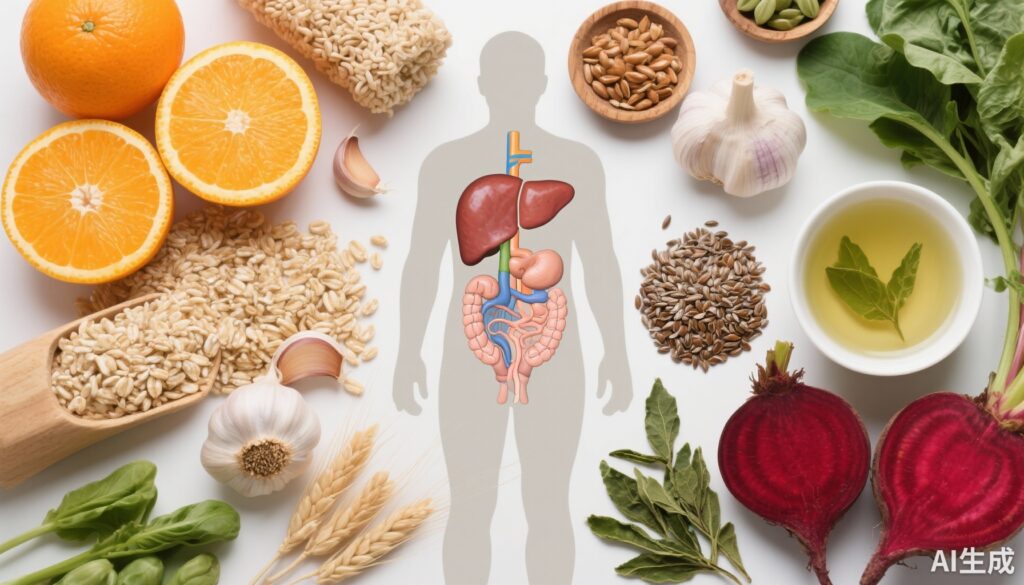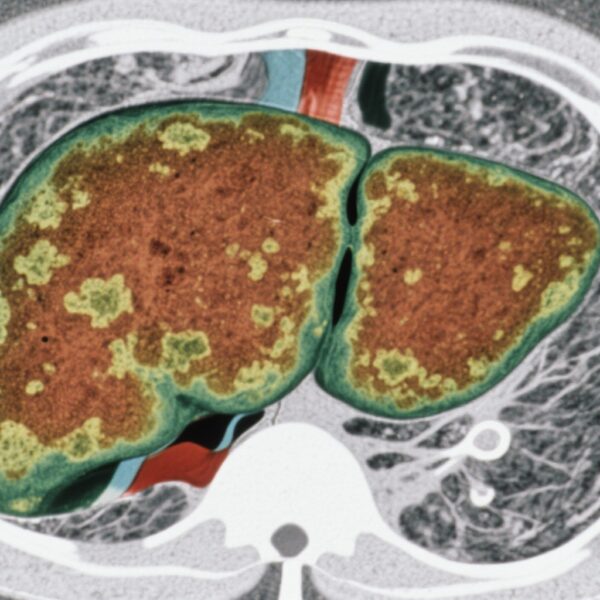Highlight
- Specific plant-based foods such as whole-grain products, beetroot juice, flaxseed, garlic, and rapeseed oil showed beneficial effects on metabolic parameters and liver function in adults with MASLD and comorbidities.
- Glycemic control improved notably with intake of several plant-based interventions including ginger, spirulina, and green coffee extract, important for MASLD patients with type 2 diabetes.
- Liver enzyme markers and hepatic steatosis were ameliorated following consumption of certain plant foods, whereas a fruit-rich diet alone had adverse metabolic impacts.
Background
Metabolic dysfunction-associated steatotic liver disease (MASLD) represents a prevalent chronic liver condition characterized by hepatic steatosis accompanied by metabolic dysregulation. MASLD frequently coexists with obesity, metabolic syndrome, and type 2 diabetes mellitus (T2DM), conditions that contribute to its disease burden. Despite rising prevalence, therapeutic options remain limited, with no approved pharmacological agents specifically indicated. Hence, lifestyle interventions including diet modifications are pivotal in MASLD management. Plant-based dietary patterns, notably the Mediterranean (MED) and Dietary Approaches to Stop Hypertension (DASH) diets, rich in bioactive phytochemicals, fibers, and unsaturated fats, have shown promising roles in improving metabolic health. However, the evidence regarding impacts of specific plant-based foods on MASLD outcomes remains fragmented and thus warrants synthesis.
Study Design
This systematic review adhered to PRISMA guidelines and included randomized controlled trials (RCTs) published between January 2020 and May 2025. The review focused on adults diagnosed with MASLD, with or without comorbid obesity, metabolic syndrome, or T2DM. Nine databases were comprehensively searched to capture relevant trials evaluating interventions incorporating individual plant-based foods delivered as components of the MED or DASH diets. Outcomes assessed included anthropometric measures, biochemical markers of glycemic control, lipid profiles, liver enzymes, and imaging or histological indices of hepatic steatosis.
Key Findings
The review identified multiple plant-based interventions with varied metabolic and hepatic effects:
Anthropometric and Blood Pressure Outcomes
- Rapeseed oil, flaxseed, and green coffee extract (GCE) demonstrated improvements in body weight, body mass index (BMI), and waist circumference, suggesting beneficial effects on adiposity.
- Sour tea and ginger intake correlated with reduced blood pressure parameters, indicating possible cardiovascular risk modulation.
Glycemic Regulation
- Whole-grain products (WGPs), GCE, flaxseed, rapeseed oil, spirulina, ginger, and garlic showed favorable effects on fasting glucose, insulin sensitivity, and glycosylated hemoglobin levels.
- These effects are particularly relevant for MASLD patients with concomitant T2DM.
Lipid Profile Improvements
- Consumption of WGPs, high-fiber buns (HFBs), beetroot juice (BJ), golden flaxseed, rapeseed oil, and garlic was associated with reductions in total cholesterol, low-density lipoprotein (LDL), and triglycerides, as well as increases in high-density lipoprotein (HDL).
Liver Enzymes and Hepatic Steatosis
- Liver enzyme markers such as alanine aminotransferase (ALT) and aspartate aminotransferase (AST) improved following WGPs, BJ, sour tea, flaxseed oil, and garlic interventions, reflecting potential hepatoprotective effects.
- Notable reductions in hepatic steatosis were observed after intake of oranges, WGPs, HFBs, BJ, flaxseed powder, rapeseed oil, and garlic powder, indicating direct beneficial effects on liver fat accumulation.
- Conversely, a diet solely rich in fruits (fruit-rich diet, FRD) showed negative impacts across metabolic and hepatic outcomes, highlighting that quality and balance of plant food intake are critical.
Safety and Limitations
The included RCTs generally reported good tolerability with no significant adverse events attributable to plant-based interventions. However, heterogeneity in intervention duration, dosages, and participant characteristics limit generalizability. The complexity of MASLD pathophysiology also necessitates cautious interpretation.
Expert Commentary
The emerging evidence underscores the promise of targeted plant-based foods as adjunctive strategies in MASLD, especially given the current pharmacologic void. Nutrients such as dietary fibers, polyphenols, antioxidants, and unsaturated fatty acids in these foods may ameliorate insulin resistance, oxidative stress, and inflammation integral to MASLD pathogenesis. Notably, the diverse effects observed with different plant foods suggest the metabolic benefits extend beyond simple nutrient classes to specific bioactive compounds and their interactions.
Clinical guidelines increasingly advocate for Mediterranean and DASH dietary patterns in metabolic disease, and this review refines understanding by pinpointing efficacious foods within these diets. Nevertheless, the adverse findings with fruit-exclusive diets caution against oversimplified dietary approaches that neglect macronutrient balance.
Further large-scale, longer-term RCTs with standardized methodologies are needed to validate these findings, elucidate mechanisms, and assess clinical outcomes such as fibrosis progression and cardiovascular events. Additionally, integration with exercise and behavioral interventions will be essential to translate dietary benefits into practice.
Conclusion
This systematic review demonstrates that selected plant-based foods within MED and DASH dietary frameworks confer meaningful improvements in metabolic and hepatic parameters among adults with MASLD and related comorbidities. Whole grains, high-fiber foods, certain oils, beetroot, garlic, and sour tea stand out as potentially hepatoprotective and metabolically advantageous. However, a nuanced approach considering food types, quantities, and patient profiles is required. These insights pave the way for evidence-based nutritional guidance in MASLD management and highlight the vital role of diet in combating the growing global burden of metabolic liver disease.
Funding and ClinicalTrials.gov
The systematic review received no specific funding. Trial registration details were not reported in the publication.
References
- Jurek JM, Zablocka-Slowinska K, Pieczynska J, Clavero Mestres H, Auguet T. Systematic Review of the Effects of Plant-Based Foods on Metabolic Outcomes in Adults with MASLD and Comorbidities Such as Obesity, Metabolic Syndrome, and Type 2 Diabetes. Nutrients. 2025 Sep 22;17(18):3020. doi: 10.3390/nu17183020. PMID: 41010543; PMCID: PMC12472190.
- European Association for the Study of the Liver (EASL), EASD, and EASO Clinical Practice Guidelines for the management of nonalcoholic fatty liver disease. J Hepatol. 2016 Jun;64(6):1388-1402.
- Esposito K, Giugliano D. Mediterranean diet and type 2 diabetes. Diabetes Metab Res Rev. 2014 Jan;30 Suppl 1:34-40.
- Barbalho SM, et al. Dietary polyphenols in metabolic and liver diseases. Nutrients. 2021 Jul;13(7):2220.



